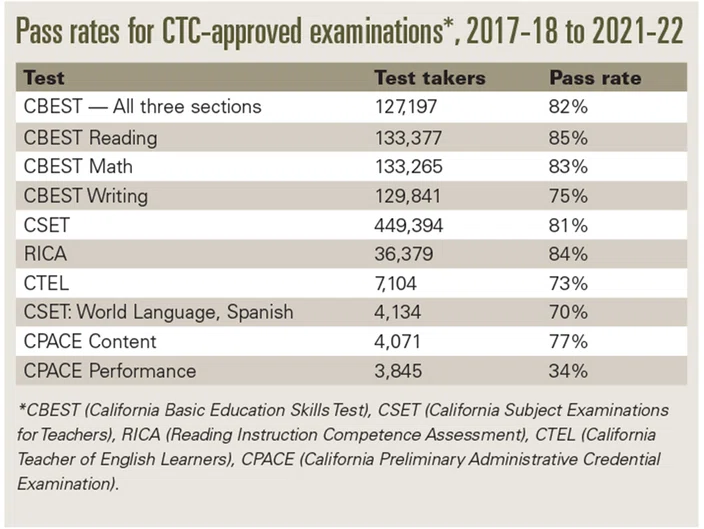Update on SB 488 reading instruction
July 10, 2023
The June meeting of the California Commission on Teacher Credentialing was attended by ACSA CTC Liaison Doug Gephart, who filed the following report.
Senate Bill 488 amended appropriate Education Code sections to require the Commission on Teacher Credentialing to complete a series of actions related to literacy instruction. These sections of statute specify that the study of effective means of teaching literacy and evidence-based means of teaching foundational reading skills are included as part of the minimum requirements for a Multiple Subject credential, Single Subject credential in English and Education Specialist credentials.
During its June meeting, the CTC approved its annual report to the Legislature on its progress meeting the requirements of SB 488.
Although the retooled PK-3 Early Childhood Education (PK-3 ECE) Specialist Instruction credential was not identified in SB 488, the commission is applying all the same requirements to this credential and its preparation programs as are required for the Multiple Subject credential.
Now that Literacy Program Standards and TPEs for preliminary Multiple, Single, Education Specialist, and the new PK-3 ECE credentials have been adopted, the commission has communicated these updates to all relevant educator preparation programs in the state. A technical assistance plan is being developed to ensure that all programs understand the new standards and TPEs and the timeline for alignment.
Next steps include:
- The literacy program standards and TPEs will replace the 2019 Literacy TPEs beginning July 1, 2024, and all credential programs will need to be aligned with these standards by that date.
- Communication efforts will continue to ensure that all programs are aware of the new literacy standards/TPEs and their effective date.
- Staff will provide technical assistance to programs throughout 2023 and 2024 to ensure that all teacher preparation programs receive support for transitioning to the new literacy program standards. All relevant credential programs will participate in a certification process, as required by SB 488, in the 2024-25 academic year.
- Establish guidelines for participation in the Cycle 2 pilot for the Multiple Subject, Education Specialist (MMSN, ESN, DHH, VI, and ECSE), and PK-3 ECE programs and candidates.
- Continue to work with the design team to draft candidate assessment guides, including tasks and rubrics, for the spring 2024 pilot.
- Work with the design team to develop the program faculty guide and provide professional development and technical assistance for programs identified for the pilot.
Transition plan for the RICA
Education Code sections require that Multiple Subject and Education Specialist candidates pass an assessment of competence in reading instruction before receiving a preliminary credential. The assessment developed by the commission for this purpose is the Reading Instruction Competence Assessment, commonly known as the RICA. The transition from the current RICA assessment to the Literacy Performance Assessment in 2025 will affect all Multiple Subject and Education Specialist candidates in preparation programs at that time and will affect candidates in PK-3 ECE Specialist Instruction Credential preparation programs once this credential is established in regulation. For most candidates, careful planning of their trajectory to completing their teacher preparation and credential requirements will lead to a successful transition.
Any assessment approved by the commission must meet the same requirements as the RICA, which are outlined in EC Section 44283. Commission staff intends to review the Foundations of Reading Test, Praxis Teaching Reading-Elementary, and state specific assessments for coverage of the requirements in Education Code and bring a future item to the commission recommending the use of one or more of these exams.
The CTC directed staff to provide official written notice to preparation programs and to ensure publication of the content of the notice on the RICA examinations website regarding transitioning to the new literacy performance assessment on July 1, 2025. Teacher preparation programs as well as candidates would have two year’s notice to plan for and make this transition.
Passing standard for the Special Education for California edTPA
During the October 2022 meeting, the commission adopted an initial passing standard for the edTPA of 40 with the application of a -2.0 Standard Error of Measurement (SEM), making the actual initial passing score 37. Because of the low number of portfolios included in the standard setting, the commission directed the assessment sponsor to collect additional data during the first year of implementation, hold a new standard setting study in spring 2023, and submit a revised recommended passing standard to commission staff in time to present to the commission for action during their June 2023 meeting.During the 2022-23 academic year, Stanford University and the Evaluation Systems group of Pearson collected additional data on scores of Education Specialist credential teacher candidates who completed the Special Education for California edTPA. The step-by-step standard setting process of examining actual candidate submissions, candidate score profiles and impact data guided participants to determine the candidate performance on edTPA that, as stated in the Briefing Book Method, “just meets the definition of performing effectively the job of a new teacher.”
After reviewing impact data, and follow-up discussion with the whole group, panelists were tasked to make a final recommendation for a cut score. Individually, each panelist completed a final cut score recommendation form and cut score recommendations.
Panelists were shown the frequencies for individual ratings of a final recommended cut score, as well as the mean, median and mode for the final cut score recommendations. The final cut score, or passing standard, recommended by the committee was the median score of 39 (M = 39.33, SD= .47). To follow the commission’s recent past practices, staff recommended, and the commission adopted, the passing standard of 39 recommended by the panel with the application of a -2.0 SEM. This would bring the actual passing score to 35. The commission adopted the recommended passing standard, and the notification will be posted on the Evaluation Systems group of Pearson examination’s website.
Passing rates of CTC-approved examinations
The commission issues credentials, certificates and permits that authorize service as a teacher, administrator, counselor or other professional service provider in California’s public schools. Pursuant to the requirements of applicable state statutes, California uses a series of commission-approved examinations to assess candidates’ competencies in basic skills, subject matter proficiency and professional knowledge.
Because of the new options for meeting the basic skills and subject matter requirements made available by AB 130, it is expected that the numbers of individuals using examinations to meet the basic skills requirement and the subject matter requirement will decrease as the new options are more fully implemented in the field. However, since candidates usually take exams before they enroll in a preparation program, it may take some time before these new options are understood by those whom pre-candidates may contact for information (e.g., high school counselors, community college advisors).
Most test takers actually take these tests before they complete education preparation programs. Consequently, the pass rate is much lower than subsequent test taking following education and training. Initial test taking data illustrates a predictable lower pass rate than test results following preparation and training. Ultimately, the critical test taking results are reflected in the cumulative pass rates for the respective examinations.
The purpose of the California Preliminary Administrative Credential Examination is to measure whether entry-level principals and other school administrators have the standards-relevant knowledge necessary for competent professional practice. In 2014, the CTC authorized updating the CPACE to include a more performance-based approach to measuring the skills necessary for performing the job of a school site principal. It is interesting to note that CPACE overall passing rates remain very low. Far more people pass the content assessment than pass the performance assessment. Candidates must pass both sections of the CPACE to pass the CPACE.
The majority of examinees who took both the content and performance portions of CPACE in 2021-22 and who responded to this background question reported having a master’s degree or higher. Examinees who reported that they work in a school district or county office setting passed at a higher rate than educators who reported working in other education settings. Three to four times as many women as men complete both sections of CPACE and women are passing CPACE at a higher rate than men. Overall, all examinations show a fairly steady passing rate pattern for the past five years, 2017-18 to 2021-22.
Other items
In other business, the commission:
Granted provisional approval for Northeastern University: Mills College (Stage III). Northeastern University: Mills College completed Stages I and II of the Initial Institutional Approval process and was approved as an eligible institution by the Commission at its February 2023 Commission meeting. This action allowed NE:MC to move forward to Stage III in which responses to Preconditions and Common Standards were submitted. NE:MC seeks COA approval of their proposed programs, including: Preliminary Multiple Credential, Preliminary Single Subject Credential, Early Childhood Special Education Credential and Preliminary Administrative Services Credential.
Granted full initial approval to Stella Middle Charter Academy (Stage V). Stella Middle Charter Academy submitted a complete Program Review submission, Common Standards Review submission, and responses to preconditions approximately six months preceding its Provisional Site Visit. The Board of Institutional Review members assigned to the site visit worked together to review all evidence submitted as part of Program Review and Common Standards Review and provided feedback to SMCA regarding its preliminary alignment to the commission’s adopted standards. In March 2023 the institution hosted its Provisional Site Visit. The commission granted full Initial Institutional Approval with the requirement that the institution address a stipulation identified in the site visit team report within the designated time frame and report back to the COA for further consideration and action.

Contact Us
www.acsa.org
© 2023 Association of California School Administrators





